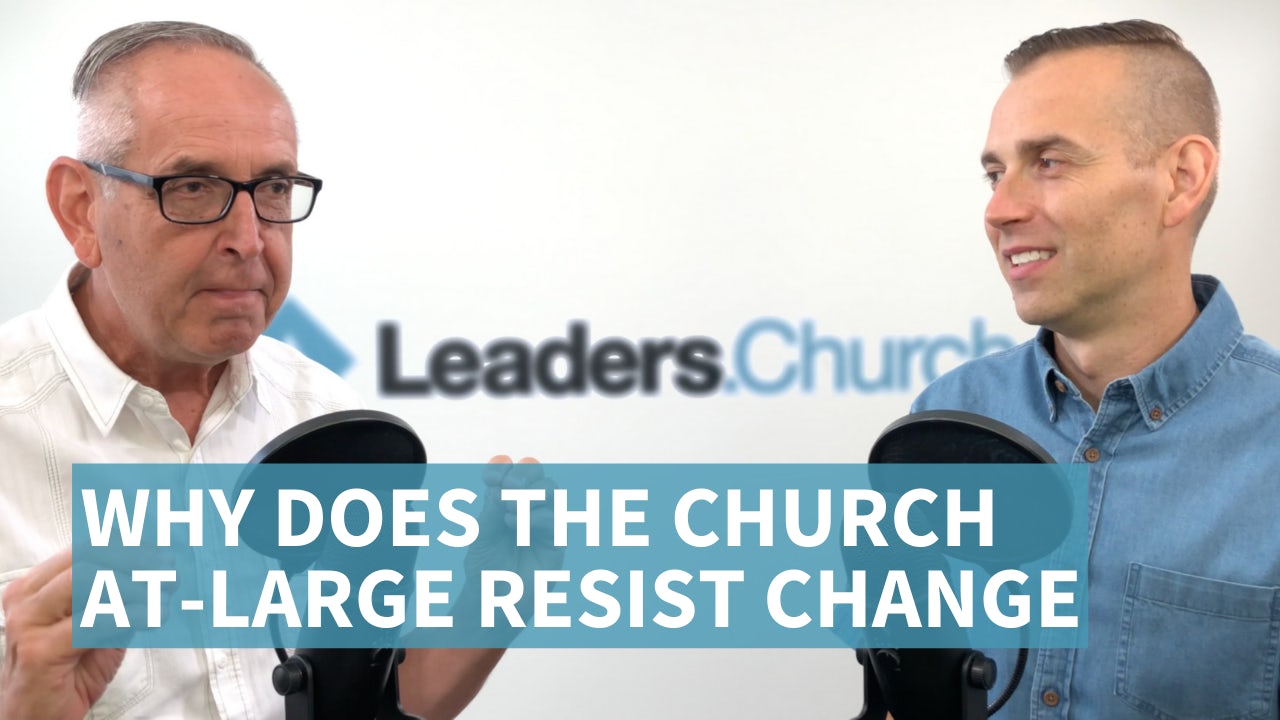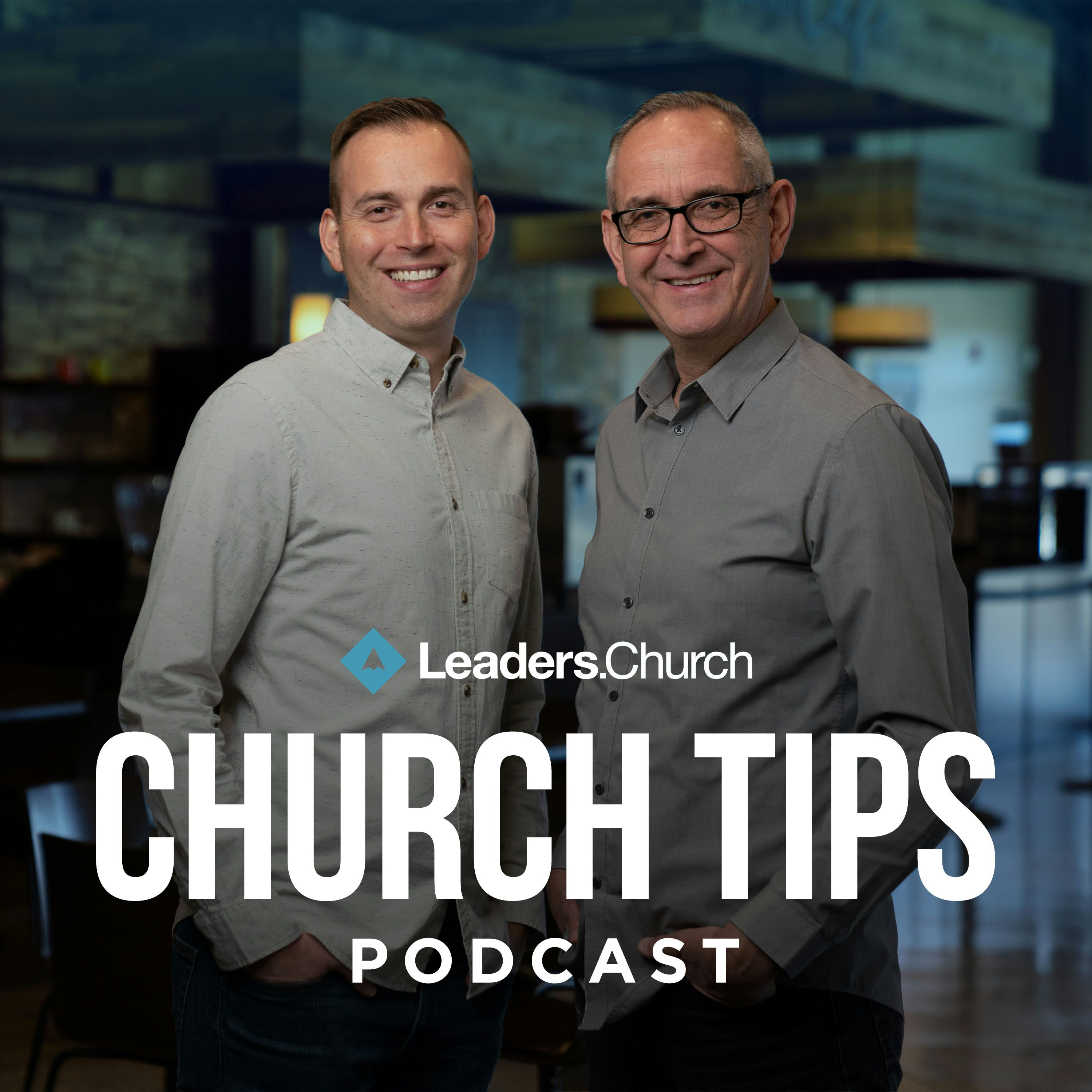032 – Why Does the Church At-Large Resist Change
What’s in this Episode?
The only thing permanent around here is change, and that’s a good thing when it’s happening to your church, but sometimes the institution of the church, really resists change. Why is that? We’re going to talk about that in this particular episode.
Read the Transcript
Dick Hardy 0:19
The other day, I was talking to a buddy of mine, Brooks Miller, good guy, and he’s in the medical field. He knows I’m in the church space. And we were just talking about how institutions over time, become change resistant. No matter what it is. Whether it’s education, business, law, church, medicine, so on. So that’s exactly what we want to talk about today. in the business of church. Why is it that the church, big C, so I’m not talking about your local church, I’m talking about the church universe at large, why does it resist change? And so we’re going to talk about four things here. Now, when we talk about these, they’re broken into kind of two categories. So the first two, Jonathan’s going to talk about, and these are generally pretty good reasons that we resist change. And then the last two are ones that I’m going to talk about that are bad reasons for resisting change. So Jonathan jump us into it!
Reason #1: The Institution of the Church Centers on Doctrine
Jonathan Hardy 1:16
Let’s jump in. So the first one is that the institution of the church centers on doctrine. And that’s a good thing, you know, and doctrine almost never changes. I mean, you could probably say, over the course of history, there’s been some, you know, minute changes, as culture changes, or as our understanding of Scripture changes and so forth. But for the most part, doctrine doesn’t really change. And so that’s a good thing. But then, when it comes to making methodical changes, or strategic changes, or other changes, we so closely align or assign our doctrine with how we do church. And as a result, people feel like it might mean we’re compromising and we’re compromising our doctrine. Or it might mean that we’re heading down a slippery slope, but that’s not actually the case. And so we have to pull, the church as a whole, has to pull themselves out and say, okay, well, doctrine is one thing, but methods and strategies is something different. And so that’s one of the reasons why it’s hard for people because of the sense that we, as believers, center our churches on doctrine. Now, we talked a little bit about this in Episode One, if you haven’t listened to Episode One, I’d encourage you to do that on the Five Reasons Why Change is So Hard. And that’s more as it relates to the local church or your local church. So be sure to check it out if you haven’t, but that’s really the first one.
Reason #2: The Institution of the Church has Absolutes
Jonathan Hardy 1:38
And then on the heels of that really the second reason why the church as a whole is so change-resistant, is because the institution of the church has absolutes. As believers, right is right, wrong is wrong. I mean, if we really believe that the Bible is the inspired Word of God, and if it’s God’s Word to us, and this is our guide for life, and this is the way we’re supposed to live our lives well, then you know what the Bible says means that’s how we have to live and so right is right, wrong is wrong. And so we have to be firm in our beliefs. And that’s a good thing. And we have that stability in Scripture, but then it goes back to what I was just talking about is because of our firm beliefs in the absolutes, then it’s hard sometimes for people to translate other types of changes different from the absolutes.
Dick Hardy 3:28
Exactly, exactly. You know, those two really are very good, solid reasons. That change is resistant, although we as leaders have to mitigate those things as we’re trying to change as you said, the methods and so on.
Reason #3: Time Calcifies the Institution
Dick Hardy 3:46
When you go to the third reason, now this gets to be real clear, this is a very difficult thing and that is that time calcifies the institution. You know, if I were to ask you which church is more likely to be growing, a church plant or an 80 or 90 year old church? It’s a church plant, because they’re young, they’re vibrant, they’re energized. They’ve got to get people and they’re on mission. The older the institution gets, and this goes back to my conversation with Brooks, because his institution is a young institution in medicine. When you compare it to old institutions in medicine, well, as a young church, you’re going to be able to move and change faster. So now, let’s think about human beings. If I said to you, he’s got a couple of kids, my grandkids, their bones, versus their grandparent’s bones, a three year olds bones, versus a ninety year old’s bones, which are brittle? The ninety year old, the ninety year old bones are brittle. That’s why when you see these archaeologists going in and they’re looking for things, they can break something that has been centuries old can crumble in no time. Time calcifies. Time calcifies your church, and if you’re not working to exercise the muscles of your church, mission, vision, leadership growth, you’re going to find yourself growing brittle. And then change is very, very difficult. Old churches that change, do not calcify. So just because you’re 80 or 90 years old as a church, doesn’t mean you have to calcify. If you look at old people that exercise, they live longer, because they’re constantly working those muscles. So I don’t want to beat a dead horse here, but time calcifies.
Reason #4: The Church Creates Security, the Status Quo
Dick Hardy 5:54
Number four. The church creates security, the status quo. Now, security is good on one hand. You know, we talked about the doctrines, we talked about the absolutes, but change rocks the boat. Change and the methods Jonathan was talking about rocks the boat. If you, as an institution, say that we want to stay the same, because Herb and Mabel in the church want us to stay the same, I can guarantee you it’ll be no growth. When you get comfortable, when the church, the institution gets comfortable, that equals forgetting mission, because mission is not comfortable. Your mission to reach spiritually lost people is alive. It’s energizing. It rocks the boat. And when you stop rocking the boat, I just guarantee you’ll be forgetting about mission.
Jonathan Hardy 6:54
So what do you say then about people who say, “well, but we have to take care of our church people and we can’t just be reaching out to the lost and unsaved.” How do you deal with that?
Dick Hardy 7:05
With that question, it’s an either/or, and it is not an either/or. You are taking care of your people and you are focused on mission. Let’s go back to those church plants/ Are those church plants taking care of their people? You bet. And are they effective to mission? You bet. You know, and we, when you talk about the people in the church, we talked about this in episodes five and six, I really would encourage you to go back and listen to those podcasts helping people buy into change, because you need buy-in. And that’s one of the roles of the pastor is to help people buy in. So there’s the four we’ve covered. Give us a snapshot of this.
Recap:
Jonathan Hardy 7:05
Let me just recap real quick. So there’s four things. The first is that the institution of the church centers on doctrine. Second, the institution of the church has absolutes, and so those are good things, but they also create this change resistance. And then on the flip side, the third thing was that time calcifies the institution of the church. And four, the church creates security, the status quo. So, with all that being said, then it comes to the point of saying, well, okay, so if we need to continue to work and taking into context, our local church, we understand now this is kind of the big picture for a big church C, but local church, how do we take this and say, okay, what are we going to do? And so that’s one of the things that I think you need to figure out for your church is, what do I do? And one of the ways that is constantly helpful for you to keep this front and center of your mind is when you’re constantly growing, and when you’re personally developing more and more as a leader, because everything rises and falls on leadership. We believe that to be true.
Dick Hardy 8:41
Absolutely!
Jonathan Hardy 8:42
And so that’s why I would encourage you, if you haven’t checked out the masterclass that I held on the four secrets that help pastors go to the next level and reach more and more people, I would encourage you to do that. And we have the replay available. All you have to do is go to leaders.church/secrets and this is the Four Secrets Masterclass. Leaders.church/secrets. Be sure to check that out, and you’ll be glad you did. And then finally, thank you so much for listening today or watching, whatever platform you’re watching or listening on. If it’s a podcast, be sure to subscribe and give us a rate and review. We’d love to hear feedback from you. If you’re on YouTube, be sure to hit that subscribe button. And we are so thankful that you’ve joined us today. Anything else?
Dick Hardy 9:21
I think we’re good to go.
Jonathan Hardy 9:22
All right. Well, we’ll look forward to seeing you next time. Take care.
Subscribe & Follow:
- Subscribe on Apple Podcasts
- Follow on Spotify
- Subscribe to YouTube Channel
- Subscribe on Google Podcasts
- Like us on Facebook
- Follow us on Instagram
- Follow us on Twitter
Other Resources:
- Leaders.Church
- Leaders.Church Blog
- Church University
- Take the Free 5 Day Leadership Challenge for Pastors
- Get Free Access to the 4 Secrets Masterclass









